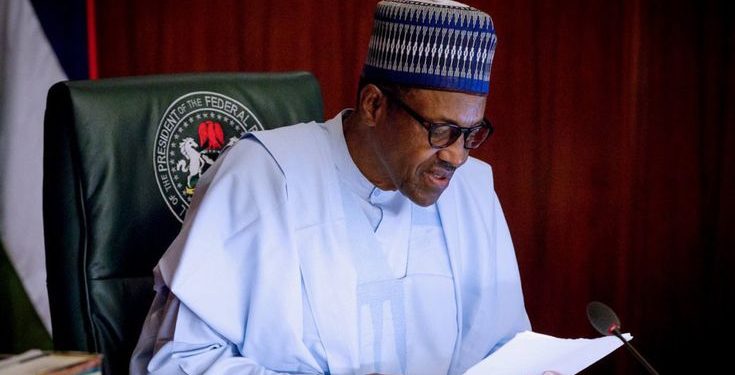Former Nigerian President Muhammadu Buhari is dead!!!!! He died at a London hospital. As of the time of this publication, no official confirmation has been issued by his family, the presidency, but trusted state sources, already confirmed this. Such as NTANTA and also close friends to the president already confirmed it too
As the nation awaits clarity on his health status, here is a comprehensive look at the life, career, and legacy of Muhammadu Buhari, a figure who defined both Nigeria’s military and democratic eras.
Early Life and Education: A Northern Son Rises
Muhammadu Buhari was born on December 17, 1942, in Daura, located in present-day Katsina State, northern Nigeria. He was the 23rd child of his father, Adamu, who died when Buhari was only four years old. Raised by his mother, Zulaihat, Buhari attended Daura and Mai’adua primary schools, then moved on to Katsina Middle School and later Katsina Provincial Secondary School (now Government College Katsina) from 1956 to 1961.
His passion for service led him to the Nigerian Military Training College (NMTC) in Kaduna in 1961. Buhari furthered his training at international military institutions, including the Mons Officer Cadet School in the UK, Defence Services Staff College in India, and the United States Army War College, where he honed his leadership and strategic command abilities.
Military Career: A Soldier of the Republic
Commissioned as a Second Lieutenant in January 1963, Buhari served with distinction across several battalions. During the Nigerian Civil War, he was appointed Commander of the 2nd Infantry Battalion, and later served as General Officer Commanding (GOC) key divisions, including the 4th Infantry Division and 3rd Armoured Division.
In 1975, Buhari was appointed Military Governor of the former North-Eastern State (which later became Borno, Yobe, Bauchi, and Gombe). He later became Federal Commissioner for Petroleum and Natural Resources under General Obasanjo and played a central role in founding the Nigerian National Petroleum Corporation (NNPC) in 1977.
Military Head of State: 1983 Coup and Iron Rule
On December 31, 1983, Major General Buhari led a military coup that ousted the civilian government of President Shehu Shagari, citing rampant corruption and economic mismanagement.
As Nigeria’s military Head of State from 1983 to 1985, Buhari introduced the controversial War Against Indiscipline (WAI) campaign aimed at restoring public morality, civic responsibility, and national pride. His regime was marked by:
- Tight control of media and press freedom
- Detention without trial of political opponents
- Stringent austerity measures
While his efforts to fight corruption were widely praised, his autocratic style earned criticism, leading to his ouster in a bloodless coup on August 27, 1985 by then Chief of Army Staff, General Ibrahim Babangida. Buhari was detained for nearly three years before being released.
Return to Democracy: The Politician Emerges
After a period of political exile, Muhammadu Buhari returned to the national stage as a democratic presidential candidate. He contested under the All Nigeria Peoples Party (ANPP) in 2003 and 2007, and later under the Congress for Progressive Change (CPC) in 2011.
In 2013, he became a founding member of the All Progressives Congress (APC)—a coalition that eventually unseated the ruling People’s Democratic Party (PDP).
In March 2015, Buhari made history by defeating incumbent President Goodluck Jonathan, marking Nigeria’s first peaceful transfer of power from one civilian government to another via the ballot box.
Presidency (2015–2023): Achievements and Challenges
Buhari served two full terms as Nigeria’s democratically elected president from May 29, 2015 to May 29, 2023. His administration focused on three major pillars:
- Anti-Corruption: Expanded EFCC operations and recovered billions in looted funds.
- Security: Focused on counter-insurgency against Boko Haram in the North East, with mixed results.
- Economic Reform: Introduced policies like the Anchor Borrowers’ Programme and signed the Petroleum Industry Act.
However, his presidency was not without criticism:
- Persistent insecurity in many regions (banditry, kidnapping, farmer-herder clashes).
- Multiple recessions and inflation.
- Repeated medical trips abroad sparked national concern about transparency and leadership.
Legacy of Muhammadu Buhari
Buhari’s rule remains polarizing in Nigerian political history. Supporters applaud his firm stance against corruption and his military background that instilled order. Critics argue that his administration struggled with economic diversification, civil liberties, and national unity.
His ideology, often referred to as “Buharism,” emphasized nationalism, discipline, and frugality but also leaned toward strong central control and militaristic governance.
Conclusion: A Life of Discipline and Dedication
Muhammadu Buhari’s legacy was deeply woven into Nigeria’s history from military rule to democratic leadership. His name symbolizes structure, discipline, and anti-corruption ideals, even if his methods have been debated.
























































